22 Feb2021
By Weade James

AACTE recognizes the challenges that many of our members are facing because of the recent winter storms. We believe that your safety and well-being are most important. As such, we are extending the application deadline for the Consortium for Research-Based and Equitable Assessments (CREA). The new deadline to apply is March 5 at 11:59 p.m. EST.
We appreciate the overwhelming interest that have been expressed to join the Consortium and hope that this extension will provide much needed respite to those impacted by widespread power and utility outages, and other challenges to their everyday needs. Given the new deadline, all applicants will be notified of their application decision on March 22, 2021.
Please direct any questions about the Call for Applications to me at wjames@aacte.org.
13 Feb2021
By Katrina Norfleet
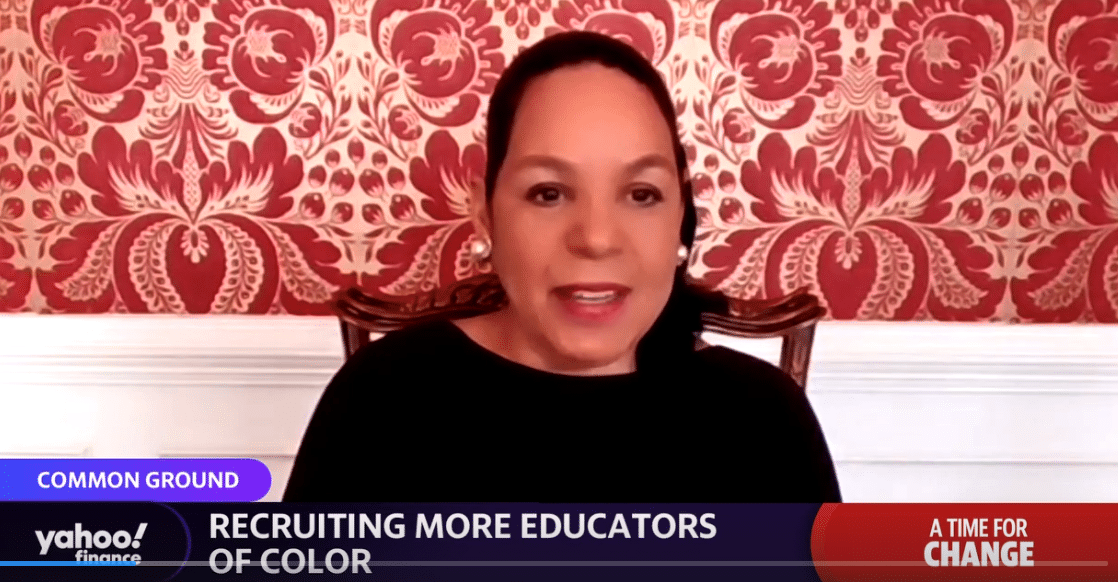 Findings show that in the public school system nationwide, only 7% of teachers, 11% of principals, and 3% of superintendents are Black. In the following Yahoo Finance Live video interview, AACTE Dean in Residence Leslie Fenwick explores this topic. She discusses the impact desegregation of public schools has had on the decline of the Black teacher pipeline and what steps should be taken to reverse the trend.
Findings show that in the public school system nationwide, only 7% of teachers, 11% of principals, and 3% of superintendents are Black. In the following Yahoo Finance Live video interview, AACTE Dean in Residence Leslie Fenwick explores this topic. She discusses the impact desegregation of public schools has had on the decline of the Black teacher pipeline and what steps should be taken to reverse the trend.
Watch the video.
11 Feb2021
By Terrance McNeil
The members of AACTE’s HBCU Teacher Education Topical Action Group (TAG) are very proud of the contributions of Historically Black Colleges and Universities’ (HBCU) educators and researchers and the work that they have done within and beyond academia. More importantly, we commend the contributions made through the discourse and praxis on equity in education. We want to celebrate these contributions and promote the excellence that emanates from HBCU educator preparation programs. We look forward to your participation at our annual business virtual meeting on February 23, 2021 from 4:00 to 6:00 pm.
In keeping with this year’s theme, Resisting Hate, Restoring Hope: Engaging in Courageous Action, The HBCU Teacher Education TAG will engage in a discussion on how we are instrumental in this purpose by using our unique positionally to provide leadership on issues of diversity and inclusion. We hope you will consider joining us.
05 Feb2021
By Jacqueline Rodriguez

Educator preparation programs have experienced a tumult of change in the last 12 months. Many of our members have experienced decreased enrollment in initial licensure teacher education programs, all during a nationwide teacher shortage. Now, more than ever before, it is our responsibility to consider what may be creating barriers for candidates to enter our programs and our profession. AACTE plans to support member institutions’ examination of assessments used for entry into preparation programs and the barriers they create for potential candidates, especially candidates of color.
02 Feb2021
By Michael W. Apple

During the virtual AACTE 2021 Annual Meeting, attendees are invited to join their peers at the Learning Lab session, Disrupting Inequities: Local and Global initiatives for Shared Responsibility in Diversity, Equity, and Social Justice on Friday, February 26, 10:00 – 11:00 a.m. AACTE member
Michael W. Apple of the University of Wisconsin addresses this topic in the following thought leadership article.
Schools, particularly public schools, are under a great threat right now. And as education leaders, it’s imperative that we understand the current environment. There is a growing anger towards our educational system that is visible statewide and at a national level. Fueled by restorative politics, many of those who have lost their faith in public schools believe that educators place too much emphasis on equitable education. Yet, while much more needs to be done, the simple fact that some people are criticizing schools must mean that we must be doing something right already. If we weren’t working at interrupting racial injustice many people, especially those who are ultra-rightists, wouldn’t be so angry at schools and teachers.
29 Jan2021
By Bianca Nightengale-Lee
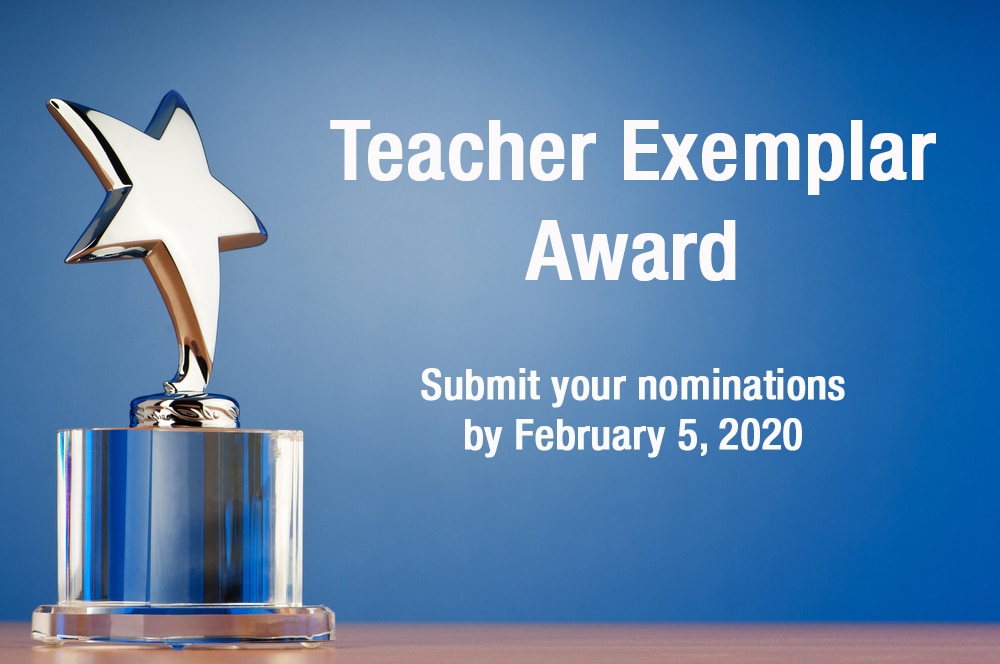
The Teacher Exemplar Award is presented by the AACTE Diversified Teacher Workforce (DTW) Topical Action Group (TAG) to recognize exceptional student/clinical teachers of Color and PK-12 mentor/cooperating teachers who serve as mentors to student/clinical teachers in field experiences. The instructional pedagogies and practices embodied by the recipients of this award reflects the DTW TAG mission and goals and advances our current understanding of the importance of cultivating a diversified teaching workforce that enhances educational opportunities for ethnically, culturally, and linguistically diverse students.
Recipients of these awards have demonstrated effective instructional/pedagogical practices, advocacy skills, and a service-minded disposition toward addressing inequities through their teaching, participation in local community, school, and/or grassroots service efforts. In recognition and honor of this important work, the recipients will receive a $500 honorarium each and be recognized in our 2021 DTW Virtual Institute. Also, the recipients will be asked to participate on the planning committee of the 2022 DTW Institute.
25 Jan2021
By Weade James
 AACTE is pleased to announce the Call for Applications for the Consortium for Research-Based and Equitable Assessments (CREA). Funded by the Bill and Melinda Gates Foundation, the purpose of the Consortium is to convene stakeholders across various states to (1) examine how cut scores for entrance into educator preparation programs are currently set, (2) identify guidelines and recommendations for setting equitable cut scores for Praxis I and similar assessments, and (3) develop model state policies that seek to attract and prepare diverse teacher candidates for the profession.
AACTE is pleased to announce the Call for Applications for the Consortium for Research-Based and Equitable Assessments (CREA). Funded by the Bill and Melinda Gates Foundation, the purpose of the Consortium is to convene stakeholders across various states to (1) examine how cut scores for entrance into educator preparation programs are currently set, (2) identify guidelines and recommendations for setting equitable cut scores for Praxis I and similar assessments, and (3) develop model state policies that seek to attract and prepare diverse teacher candidates for the profession.
The Consortium of state teams shall be comprised of educator preparation programs and representatives from state and local education agencies. Participants must commit to one full year of participation, which will include quarterly meetings and pre-work between meetings to accomplish the goals of the Consortium.
19 Jan2021
By Maria Hyler
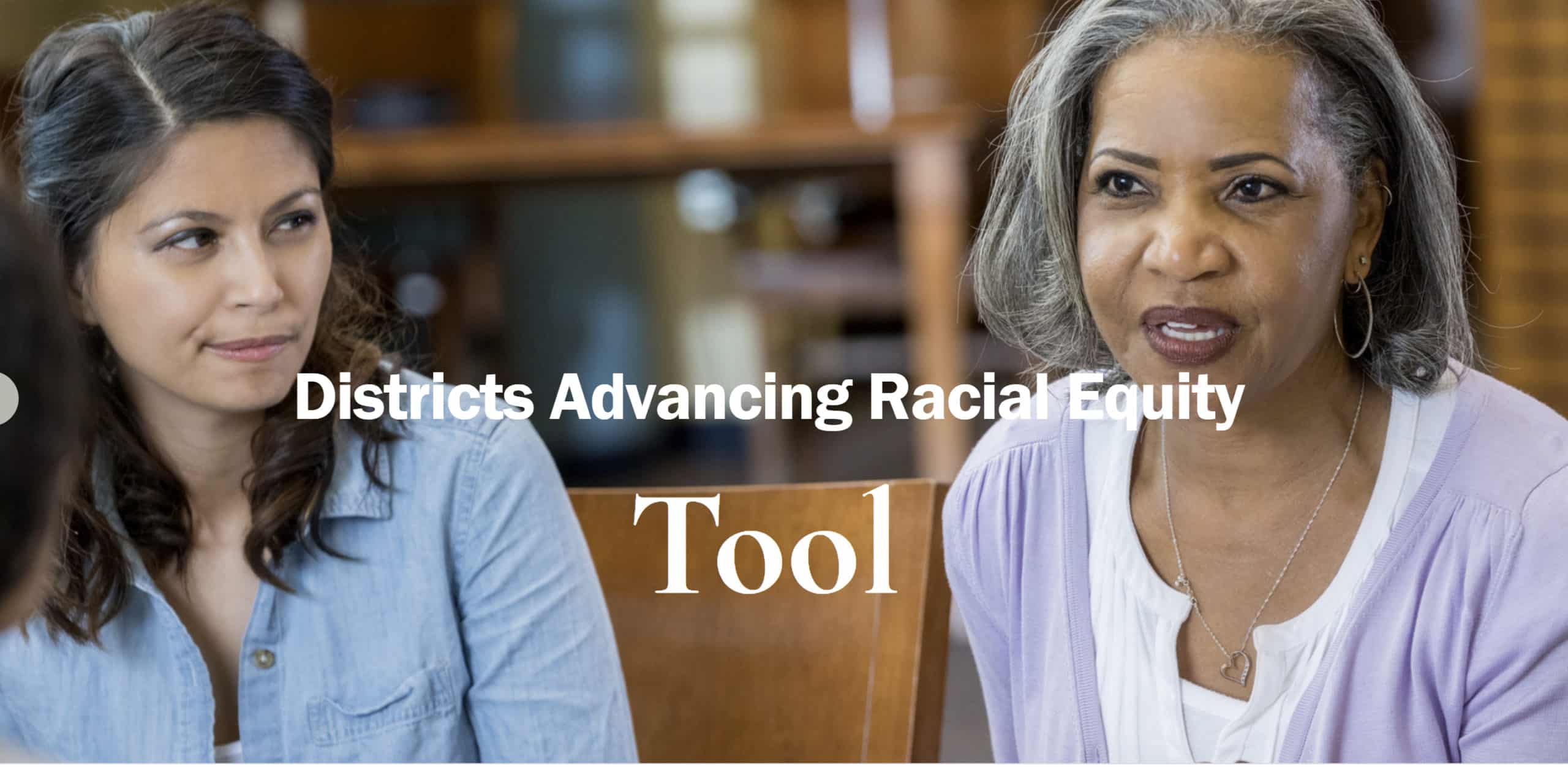
This article originally appeared on the Learning Policy Institute website an is reprinted with permission. The article was written by Maria E. Hyler, Desiree Carver-Thomas, Marjorie Wechsler, and Larkin Willis.
Decades of reforms have proven insufficient to address persistent racial disparities in educational opportunities. In school systems across the United States, meaningful efforts to ensure access to strong educational opportunities require a bold and significant shift. Policies and practice must not only prevent discrimination; they must move beyond simple notions of equality—in which every student gets the same—to equity—in which all students get what they need to develop academically, socially, emotionally, and physically.
School leaders who have been committed to racial equity understand the historical legacy of structural racism that reaches to our present context and that results in the educational opportunity gaps that students still experience. District staff who have focused on racial equity recognize that students’ individualized experiences, opportunities, and successes in school are deeply contextualized in the social reality of institutionalized racism across the United States. They seek to educate the individuals and ameliorate the systems that perpetuate inequitable opportunities and resulting outcomes for students.
13 Jan2021
By Brian McNeill
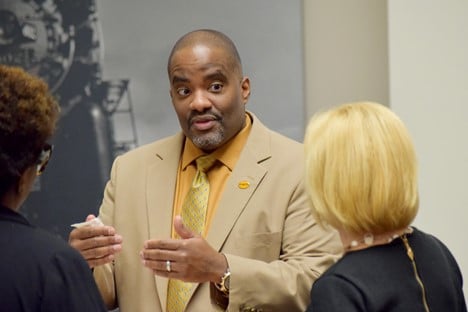
This article originally appeared in VCU News and is reprinted with permission.
Andrew P. Daire, Ph.D., dean of the School of Education at Virginia Commonwealth University, was appointed Wednesday as a co-chair of Virginia’s new advisory committee charged with making recommendations on culturally relevant and inclusive education practices in Virginia’s public schools.
The Culturally Relevant and Inclusive Education Practices Advisory Committee, which was established by the General Assembly during the 2020 session, held its inaugural virtual meeting Wednesday and Gov. Ralph Northam announced its leadership and members.
“Inclusive and culturally relevant learning environments are vital to creating equitable pathways to success for all Virginians,” Northam said in a news release. “The work of this committee will advance our ongoing efforts to tell the complete and accurate story of Virginia’s complex past, improve our history standards, and give educators opportunities to engage in important conversations and lessons with their students.”
12 Jan2021
By Gail Richmond
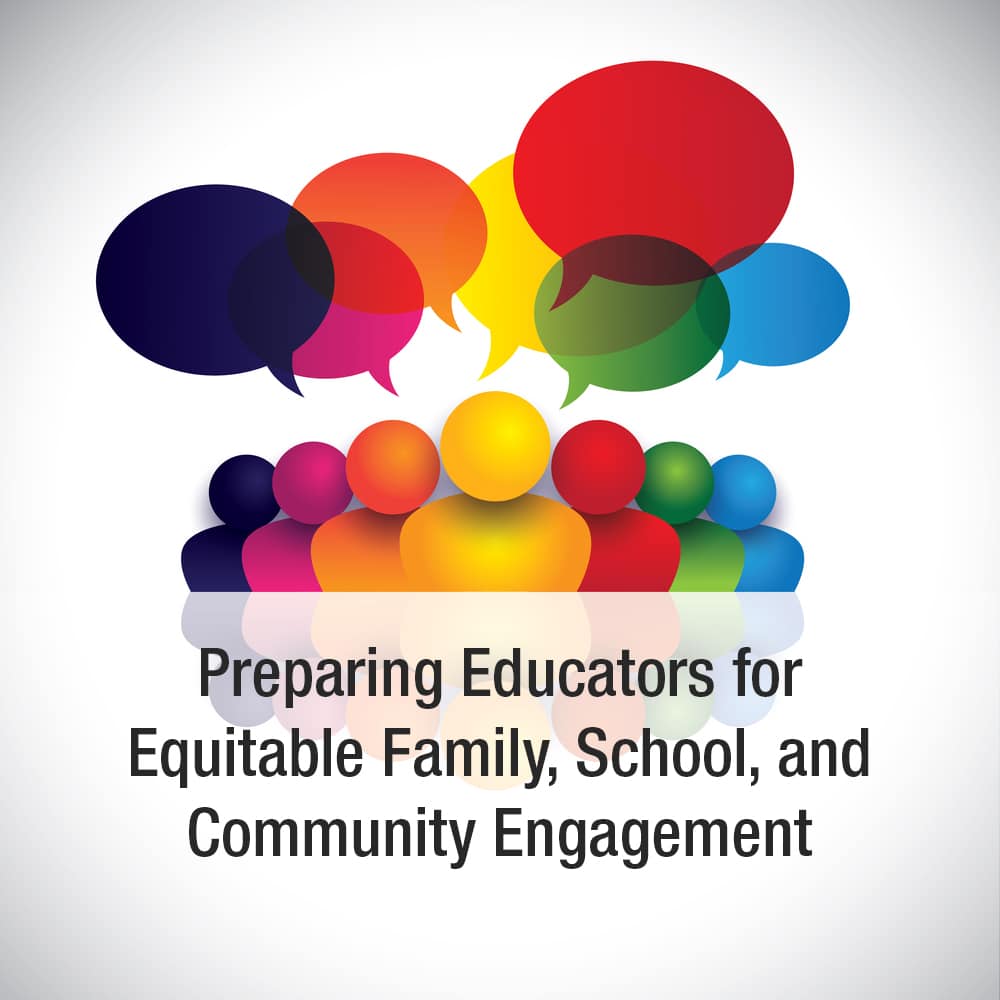 During the virtual AACTE 2021 Annual Meeting, attendees are invited to join their peers at the Learning Lab session, Preparing Educators for Equitable Family, School, and Community Engagement on Thursday, February 25 from 3:45 – 4:45 p.m. AACTE member Gail Richmond of Michigan State University addresses this topic in the following thought leadership article.
During the virtual AACTE 2021 Annual Meeting, attendees are invited to join their peers at the Learning Lab session, Preparing Educators for Equitable Family, School, and Community Engagement on Thursday, February 25 from 3:45 – 4:45 p.m. AACTE member Gail Richmond of Michigan State University addresses this topic in the following thought leadership article.
Effective educators see themselves as more than just employees in a building. They consider themselves to be contributing members of a greater community. Educators do so much more than teach children academic lessons; they play a very important role in helping families and preparing young people to lead healthy and productive lives and to make their communities supportive and safe places to live. The more teachers know about the needs of their students, their families, and the communities in which they live, the more responsive they can be to those needs.
Powerful professional learning is the result of identifying and addressing relevant problems specific to individuals based on their own development and needs. Powerful professional learning also enables teachers to expand their perspectives and to refine their teaching strategies in order to be responsive to the students they educate, their family members, and the greater community.
07 Jan2021
By AACTE
The following statement was included in a Washington Post article on January 7.
AACTE President and CEO Lynn M. Gangone issued the following statement today regarding the horrific events that took place yesterday, January 6, 2021, at the U.S. Capitol building:
“Our nation experienced a serious threat to our treasured democracy as rioters stormed one of our nation’s sacred buildings, the U.S. Capitol, intending damage and insurrection. We witnessed a challenge to our democracy that none of us could ever have imagined. Generated by our nation’s President, some Members of Congress, and their denial of the results of our free and open electoral process, this unlawful invasion of the Capitol has left us all stunned. Never could we imagine such an event would occur in our nation’s capital, the seat of our democracy.
We are further outraged by the vast difference in how these rioters were treated by police as compared to how peaceful protesters for Black Lives Matter have been treated. The discrepancies are stark and maddening.
06 Jan2021
By Susan Baker

This article is part of a series that originally appeared on the Education First Blog and is reprinted with permission.
Here in the College of Education at California State University Sacramento, we’ve been in the business of preparing teachers for 73 years, and in the past few years have prepared approximately 380 teachers annually across 12 certification areas. A central aspect of our offerings across these programs is a focus on helping candidates understand the relationship between societal inequities and student learning, with special focus on race, class, gender, and other socially constructed categories. We knew that these understandings were key to our candidates’ success in developing equitable, healthy relationships with their K-12 students.
But we found that this wasn’t enough. The mentor teachers who support our candidates in their clinical experiences started asking us faculty some tough questions about whether these aspects of our preparation really prepared our candidates to be ready to teach all children on day one. Was the preparation coherent and clear for candidates? Were candidates provided opportunities to practice the ways in which teachers cultivate equitable, culturally responsive anti-racist classroom environments?
05 Jan2021
By Marvin Lynn
T his article originally appeared in Diverse Issues in Higher Education and is reprinted with permission.
his article originally appeared in Diverse Issues in Higher Education and is reprinted with permission.
As we embark upon a new year, it is important for education leaders to reflect on 2020 in order to assess what we got right, determine what went wrong, and then set a course for a more equitable education for all students in 2021.
The COVID-19 pandemic illuminated the multiple and complex inequalities that exist in our schools. In remote learning environments, students who were already disengaged from school, in some cases, became more detached and harder to reach, particularly the population of historically underserved and marginalized PK-12 students. Undergraduate programs in higher education experienced similar issues, as some students felt more marginalized and isolated due to not being in classrooms. The pandemic has taught us that educator preparation programs must instill in teacher candidates the importance of building relationships. If educators don’t develop healthy and sound relationships based upon mutual trust with their students, then it’s harder to teach—and definitely harder to reach—those students for whom school is not a positive experience.
05 Jan2021
By AACTE
AACTE has launched a new initiative to examine state-level teacher certification assessment scores, with the goal to improve equitable and inclusive practices for promoting a diverse educator workforce. The initiative, funded by the Bill & Melinda Gates Foundation, will enable AACTE to develop national guidelines and recommendations for state education leaders in establishing criteria for equitable evaluations for teacher candidates seeking state licensure.
“Left uninterrogated, standardized tests of any sort tend to spur inequalities, rather than resolve them,” said Leslie T. Fenwick, AACTE dean in residence. “If entrance exams are decimating the ranks of prospective pre-service teachers of color, we have a moral and practical obligation to correct the outsized impact of these tests on the future of our profession.”
17 Dec2020
Increase Focus on Technology and Commitment to Equity and Diversity
By Matt Vanover
 The Council for the Accreditation of Educator Preparation (CAEP) Board of Directors has approved changes to the 2013 CAEP Standards for educator preparation. The CAEP Standards guide the nation’s top schools of education, those that are CAEP accredited, in preparing future K-12 teachers. The changes the Board approved include streamlining language, strengthening emphasis on technology, equity, and diversity. The revised standards are in effect for providers with visits in spring 2022.
The Council for the Accreditation of Educator Preparation (CAEP) Board of Directors has approved changes to the 2013 CAEP Standards for educator preparation. The CAEP Standards guide the nation’s top schools of education, those that are CAEP accredited, in preparing future K-12 teachers. The changes the Board approved include streamlining language, strengthening emphasis on technology, equity, and diversity. The revised standards are in effect for providers with visits in spring 2022.
“The changes to the standards maintain our commitment to continuous improvement for our organization and our providers. The CAEP Standards were developed in 2013 to unify the profession under a single set of standards, with a commitment to ensure they remain rigorous. The enhancement to the standards is based on research to ensure rigor and relevance,” said CAEP President Christopher A. Koch. “CAEP providers are committed to preparing graduates that are ready to teach all students on the first day they enter a classroom.”








 Findings show that in the public school system nationwide, only 7% of teachers, 11% of principals, and 3% of superintendents are Black. In the following Yahoo Finance Live video interview, AACTE Dean in Residence Leslie Fenwick explores this topic. She discusses the impact desegregation of public schools has had on the decline of the Black teacher pipeline and what steps should be taken to reverse the trend.
Findings show that in the public school system nationwide, only 7% of teachers, 11% of principals, and 3% of superintendents are Black. In the following Yahoo Finance Live video interview, AACTE Dean in Residence Leslie Fenwick explores this topic. She discusses the impact desegregation of public schools has had on the decline of the Black teacher pipeline and what steps should be taken to reverse the trend. 

 AACTE is pleased to announce the Call for Applications for the Consortium for Research-Based and Equitable Assessments (CREA). Funded by the Bill and Melinda Gates Foundation, the purpose of the Consortium is to convene stakeholders across various states to (1) examine how cut scores for entrance into educator preparation programs are currently set, (2) identify guidelines and recommendations for setting equitable cut scores for Praxis I and similar assessments, and (3) develop model state policies that seek to attract and prepare diverse teacher candidates for the profession.
AACTE is pleased to announce the Call for Applications for the Consortium for Research-Based and Equitable Assessments (CREA). Funded by the Bill and Melinda Gates Foundation, the purpose of the Consortium is to convene stakeholders across various states to (1) examine how cut scores for entrance into educator preparation programs are currently set, (2) identify guidelines and recommendations for setting equitable cut scores for Praxis I and similar assessments, and (3) develop model state policies that seek to attract and prepare diverse teacher candidates for the profession. 

 During the virtual AACTE 2021 Annual Meeting, attendees are invited to join their peers at the Learning Lab session, Preparing Educators for Equitable Family, School, and Community Engagement on Thursday, February 25 from 3:45 – 4:45 p.m. AACTE member Gail Richmond of Michigan State University addresses this topic in the following thought leadership article.
During the virtual AACTE 2021 Annual Meeting, attendees are invited to join their peers at the Learning Lab session, Preparing Educators for Equitable Family, School, and Community Engagement on Thursday, February 25 from 3:45 – 4:45 p.m. AACTE member Gail Richmond of Michigan State University addresses this topic in the following thought leadership article. 
 his article originally appeared in
his article originally appeared in  The Council for the Accreditation of Educator Preparation (CAEP) Board of Directors has approved changes to the 2013 CAEP Standards for educator preparation. The CAEP Standards guide the nation’s top schools of education, those that are CAEP accredited, in preparing future K-12 teachers. The changes the Board approved include streamlining language, strengthening emphasis on technology, equity, and diversity. The revised standards are in effect for providers with visits in spring 2022.
The Council for the Accreditation of Educator Preparation (CAEP) Board of Directors has approved changes to the 2013 CAEP Standards for educator preparation. The CAEP Standards guide the nation’s top schools of education, those that are CAEP accredited, in preparing future K-12 teachers. The changes the Board approved include streamlining language, strengthening emphasis on technology, equity, and diversity. The revised standards are in effect for providers with visits in spring 2022.